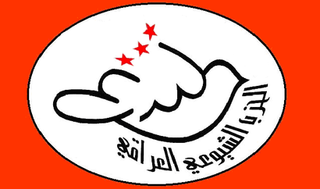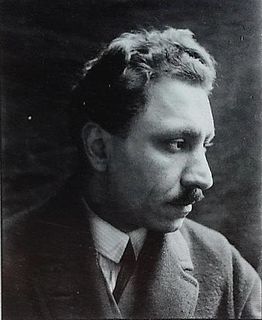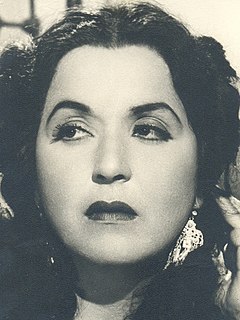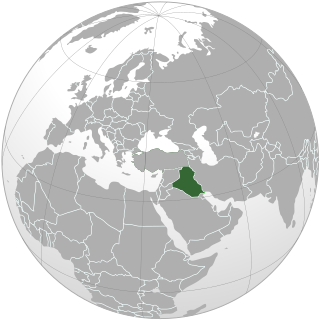
Baghdad is the capital of Iraq and the second-largest city in the Arab world after Cairo. It is located on the Tigris near the ruins of the ancient Akkadian city of Babylon and the Sassanid Persian capital of Ctesiphon. In 762 CE, Baghdad was chosen as the capital of the Abbasid Caliphate, and became its most notable major development project. Within a short time, the city evolved into a significant cultural, commercial, and intellectual center of the Muslim world. This, in addition to housing several key academic institutions, including the House of Wisdom, as well as a multiethnic and multi-religious environment, garnered it a worldwide reputation as the "Center of Learning".

Gertrude Margaret Lowthian Bell, CBE was an English writer, traveller, political officer, administrator, and archaeologist. She spent much of her life exploring and mapping the Middle East, and became highly influential to British imperial policy-making as an Arabist due to her knowledge and contacts built up through extensive travels. During her lifetime, she was highly esteemed and trusted by British officials such as High Commissioner for Mesopotamia Percy Cox, giving her great influence. She participated in both the 1919 Paris Peace Conference (briefly) and the 1921 Cairo Conference, which helped decide the territorial boundaries and governments of the post-War Middle East as part of the partition of the Ottoman Empire. Bell believed that the momentum of Arab nationalism was unstoppable, and that the British government should ally with nationalists rather than stand against them. Along with T. E. Lawrence, she advocated for independent Arab states in the Middle East following the collapse of the Ottoman Empire, and supported the installation of Hashemite monarchies in what is today Jordan and Iraq.

The Iraqi Communist Party is a communist party and the oldest active party in Iraq. Since its foundation in 1934, it has dominated the left in Iraqi politics. It played a prominent role in shaping the political history of Iraq between its foundation and the 1970s. The Party was involved in many of the most important national uprisings and demonstrations of the 1940s and 1950s. It suffered heavily under the Ba'ath Party and Saddam Hussein but remained an important element of the Iraqi opposition and was a vocal opponent of the United Nations sanctions imposed on Iraq after the Gulf War of 1991. It opposed the United States invasion of Iraq in 2003 but since then has participated in the new political institutions. It received little support in the Iraqi general elections of 2005. The party reportedly gained some seats in each province in which the 2013 Iraqi governorate elections were held.

Celadet Alî Bedirxan, also known as Mîr Celadet, was a Kurdish diplomat, writer, linguist, journalist and political activist. He held a master's degree in law from Istanbul University, completed his studies in Munich, and spoke several languages including Arabic, Kurdish, Russian, German, Turkish, Persian and French. He left Turkey in 1923 when the Kemalists declared a new republic. In 1927, at a Kurdish conference held in Beirut, a committee was formed, the Xoybûn. He is known for having been the first modern linguist to compile and organise the grammar of the modern form of the Northern Kurdish language, Kurmanji, and having designed the Latin-based Hawar alphabet, which is now the formal alphabet of Kurmanji and is also sometimes used for the other dialects of the Kurdish Language, having replaced the Arabic-based, Cyrillic-based, Persian-based and Armenian-based alphabets formerly used for Kurmanji.

Women in journalism are individuals who participate in journalism. As journalism became a profession, women were restricted by custom from access to journalism occupations, and faced significant discrimination within the profession. Nevertheless, women operated as editors, reporters, sports analysts and journalists even before the 1890s in some countries as far back as the 18th-century.
Muḥsin Sayyid Mahdī al-Mashhadani was an Iraqi-American Islamologist and Arabist. He was a leading authority on Arabian history, philology, and philosophy. His best-known work was the first critical edition of the One Thousand and One Nights.
The mass media in Iraq includes print, radio, television, and online services. Iraq became the first Arab country to broadcast from a TV station, in 1954. As of 2020, more than 100 radio stations and 150 television stations were broadcasting to Iraq in Arabic, English, Kurdish, Turkmen, and Neo-Aramaic.

Jamil Sidqi al-Zahawi was a prominent Iraqi poet and philosopher. He is regarded as one of the greatest contemporary poets of the Arab world and was known for his defence of women's rights.
The status of women in Iraq at the beginning of the 21st century is affected by many factors: wars, sectarian religious, is not a resinous conflict, debates concerning Islamic law and Iraq's Constitution, cultural traditions, and modern secularism. Hundreds of thousands of Iraqi women are widowed as a result of a series of wars and internal conflicts. Women's rights organizations struggle against harassment and intimidation, while they work to promote improvements to women's status in the law, in education, the workplace, and many other spheres of Iraqi life, and to curtail abusive traditional practices such as honor killings and forced marriages.
Al Fatat was an Arabic women's magazine published in Alexandria, Egypt. The magazine was the first Arab women's magazine and was one of the earliest publications in the country. It was published from 1892 to 1894. Al Fatat is the forerunner of the women's magazines in the Arab countries.

The Suffragist was a weekly newspaper published by the Congressional Union for Woman Suffrage in 1913 to advance the cause of women's suffrage. The publication was first envisioned as a small pamphlet by the Congressional Union (CU), a new affiliate of the National American Woman Suffrage Association (NAWSA), which in 1917 became the NWP. It evolved into an eight-page weekly tabloid newspaper when the first issue appeared on 15 November 1913.
L'Égyptienne was a French language monthly women's magazine published in Cairo, Egypt, from 1925 to 1940. It was one of the earliest women's magazines and feminist periodicals in the country.
Ilene Prusher is an American journalist and novelist.

Iraqi art is one of the richest art heritages in world and refers to all works of visual art originating from the geographical region of what is present day Iraq since ancient Mesopotamian periods. For centuries, the capital, Baghdad was the Medieval centre of the literary and artistic Arab world during the Abbasid Caliphate, in which Baghdad was the capital, but its artistic traditions suffered at the hands of the Mongol invaders in the 13th century. During other periods it has flourished, such as during the reign of Pir Budaq, or under Ottoman rule in the 16th century when Baghdad was known for its Ottoman miniature painting. In the 20th century, an art revival, which combined both tradition and modern techniques, produced many notable poets, painters and sculptors who contributed to the inventory of public artworks, especially in Baghdad. These artists are highly regarded in the Middle East, and some have earned international recognition. The Iraqi modern art movement had a profound influence on pan-Arab art generally.

Fatima Rushdi (1908-1996) was an Egyptian actress, singer, film director, and producer who was one of the pioneers of Egyptian cinema.
Dalal Khalil Safadi was a Lebanese writer and translator. Considered a pioneer in the short story genre among Middle Eastern women, she was the first woman to publish a short story collection in Iraq.
Salima Abi Rashed, was a Lebanese lawyer and journalist, considered the country's first female lawyer. She founded one of Lebanon's earliest women's magazines, Fatat Lobnan, in 1914.

The Iraqi Women’s Union (IWU) was a women's advocacy group founded in 1945 which lasted until the Iraqi government crackdown on leftist organizations in the late 1950s. Throughout the course of its operation, the IWU focused on advocating on behalf of key women’s issues regarding education, marriage rights, and labour rights, while equally engaging in charitable social work first hand. Due to the political climate in Iraq at the time, the union is known for having heavily antagonized male traditionalists while simultaneously retaining close ties to the political elite. The organization built its foundation upon other female advocacy groups which had emerged prior in the Middle East, and acted as a coordinating body for these other groups’ activities. The growth of the union was further catalyzed during the late 1940s as female advocacy groups had gained prominence during the Second World War.
Pauline Hassoun, Arabic: بولينا حسون was an Iraqi journalist and teacher, who was the first woman to found and publish a magazine in Iraq.










